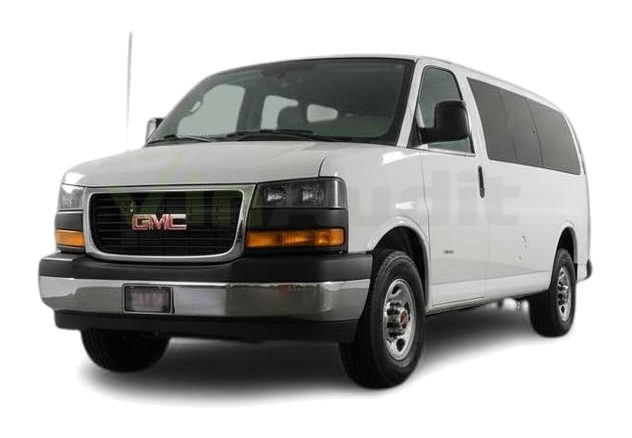The Good
The 2020 GMC Savana boasts robust performance with potent V8 engine options, offering exceptional towing and hauling capabilities. Its proven, body-on-frame platform contributes to high reliability, appealing to practical buyers seeking a dependable workhorse. While its design is utilitarian, it provides great value, easy upfitting, and a straightforward ownership experience. Emotionally, it inspires confidence as a "get-the-job-done" vehicle.
The Bad
Known weaknesses for the 2020 GMC Savana include its significantly outdated interior design and a notable lack of modern standard technology and advanced driver-assistance features compared to rivals. Fuel economy can be a drawback, particularly with the powerful V8 engines, and its ride quality is distinctly truck-like and firm, sacrificing some passenger comfort.
2020 GMC Savana: Quick Overview
- Engine Options: The 2020 GMC Savana offered a choice of powerful and durable engines:
- 4.3L V6 gasoline engine (LV3)
- 6.0L V8 gasoline engine (L96, or LC8 for CNG/LPG capable)
- 2.8L Duramax Turbo-Diesel four-cylinder (LWN) was also available for certain configurations, though less common. - Horsepower:
- 4.3L V6: 276 horsepower and 298 lb-ft of torque
- 6.0L V8: 341 horsepower and 373 lb-ft of torque
- 2.8L Duramax: 181 horsepower and 369 lb-ft of torque - Fuel Economy (EPA estimates vary by configuration, rear-wheel drive):
- 4.3L V6: Approximately 17 MPG combined (15 city/20 highway)
- 6.0L V8: Approximately 14-15 MPG combined (11 city/16 highway)
- 2.8L Duramax: Approximately 20-22 MPG combined (19 city/25 highway) - 0-60 MPH Times: These are not performance vehicles, and official 0-60 times are rarely published. Estimates suggest the 6.0L V8 models could reach 60 mph in the 8-10 second range, while V6 and diesel models would be slower.
- Towing Capacity: Varies significantly based on engine, wheelbase, and configuration. Max towing capacity can reach up to 10,000 pounds when properly equipped with the 6.0L V8 engine.
- Trim-Level Features:
- Cargo Van: Designed for commercial use, offering basic features like vinyl seats, AM/FM radio, steel wheels, and a largely unfinished cargo area ready for upfitting. Minimal tech, focused on utility.
- Passenger Van LS: Adds basic passenger amenities, including cloth seats, front and rear air conditioning, power windows and locks, and seating for 8, 12, or 15 passengers depending on wheelbase.
- Passenger Van LT: Builds on the LS with additional comfort and convenience features such as cruise control, remote keyless entry, and upgraded exterior trim. Optional features like a 7-inch touchscreen infotainment system, Bluetooth, Apple CarPlay, Android Auto, and a Wi-Fi hotspot become available. All trims include StabiliTrak stability control and a standard rearview camera.
2020 GMC Savana Specifications
Vehicle Information
| Year | 2020 |
| Make | GMC |
| Model | Savana |
| Trim | - |
| Style | Extended |
| Type | Truck |
| Category | Cargo Van |
Manufacturing Details
| Made In | United States |
| Manufacturing City | WENTZVILLE |
Dimensions
| Doors | - |
| Curb Weight | - |
| Gross Vehicle Weight Rating | 10000 pounds |
| Overall Height | - |
| Overall Length | - |
| Overall Width | - |
| Wheelbase Length | - |
| Standard Seating | 12 |
Engine & Performance
| Engine | L96 - Flexible Fuel Engine, Iron |
| Engine Size | 6L |
| Engine Cylinders | 8 |
| Transmission | 8 Automatic |
| Transmission Type | Automatic |
| Transmission Speeds | 8-Speed |
| Drivetrain | Rear-Wheel Drive |
Additional Features
| Anti-Brake System | Standard |
| Steering Type | - |
Pricing
| Manufacturer Suggested Retail Price (MSRP) | - |
| Invoice Price | - |
| Delivery Charges | - |
Vehicle History Report
Specifications
History
Events
History Check
Check
Check
Check
Check
Listings
Recalls
Check
Analysis
What Problems Does the 2020 GMC Savana Have?
While major transmission issues were more associated with older 4-speed units, the 2020 models utilize more modern 6-speed or 8-speed automatics. However, under constant heavy-duty commercial use, any transmission can experience accelerated wear. Rust is a long-term concern, especially in areas with road salt, often appearing on chassis components, rocker panels, and around wheel wells over time. Fuel system components, like fuel pumps or injectors, can also develop issues.
For the 2020 model year specifically, the National Highway Traffic Safety Administration (NHTSA) has issued several recalls. These include concerns about the potential for an incorrect tire placard, which could lead to vehicle overloading. Other recalls have addressed a risk of battery cable short circuiting, posing a fire hazard, and fuel pump module welds that could fail, leading to fuel leaks and a fire risk. Inoperative front turn signals and power steering hoses that could detach, resulting in a loss of power steering, were also subjects of recalls. Finally, a recall was issued regarding a transmission shift cable that might detach, causing the gear display to be inaccurate and potentially allowing the vehicle to roll away when parked. Owners should verify all recall repairs have been completed. Despite these, the platform is generally known for long-term mechanical resilience with proper maintenance.
How long will the 2020 GMC Savana last?
Over time, weaknesses tend to be in the interior, where plastics and seating materials can show significant wear from heavy use. Suspension components, particularly when subjected to constant heavy loads, will require replacement. Rust can become a concern on body panels and the frame in colder, salt-prone climates. While the core mechanicals are strong, age-related electrical issues can surface, and catalytic converter failures are possible later in its lifespan.
What Technology & Safety Features are Included?
In terms of driver-assistance and safety features, the Savana provides fundamental protections. Standard safety equipment includes StabiliTrak electronic stability control, traction control, and a comprehensive airbag system. A rearview camera became standard for the 2020 model year, significantly aiding parking and maneuvering in tight spaces. For improved awareness, several optional driver-assistance features were available, marking a step towards modern safety. These included Rear Park Assist, Side Blind Zone Alert, Lane Departure Warning, and Forward Collision Alert, offering helpful warnings to the driver in various scenarios.
Regarding crash-test ratings, full comprehensive assessments from agencies like the National Highway Traffic Safety Administration (NHTSA) or the Insurance Institute for Highway Safety (IIHS) are typically not conducted for heavy-duty commercial vans such as the GMC Savana. Due to their commercial classification and often varying configurations, these vehicles are not subjected to the same standardized testing as passenger cars and light-duty SUVs. Therefore, extensive crash-test ratings for the 2020 GMC Savana are not widely available.
What Colors Options are Available?
2020 GMC Savana Prices and Market Value
2020 GMC Savana Cost of Ownership
2020 GMC Savana Fuel Efficiency
2020 GMC Savana Safety Rating
NHTSA
2020 GMC Savana Insurance
reasonable repair costs.
How Does the 2020 GMC Savana Compare to Other Truck?
In terms of Performance, the Savana, with its optional V8, often outshines rivals in raw towing capacity and offers a traditional, truck-like driving feel. The Ford Transit offers a range of potent EcoBoost V6 engines, providing strong performance with more car-like handling. The Ram ProMaster, being front-wheel-drive, offers good cargo capacity but lower towing, while the Sprinter typically focuses on diesel power, offering excellent torque and fuel economy.
Regarding Features, the Savana lags behind. Its interior design is notably outdated, and while it offers optional modern tech like a touchscreen with Apple CarPlay/Android Auto and some driver-assistance features, these are typically standard or more integrated in rivals. The Transit, ProMaster, and especially the Sprinter offer more modern interiors, advanced infotainment, more sophisticated driver-assistance suites, and crucially, multiple roof height and length configurations not available on the Savana.
Reliability is a strong suit for the Savana. Its long-standing, robust platform and proven powertrains mean fewer complex systems that can fail, leading to a reputation for dependability when properly maintained. The Transit and ProMaster are also generally reliable, but with more contemporary designs, they can have more complex electronic systems. The Sprinter is known for its durability but can incur higher repair costs due to specialized parts and service.
For Price, the Savana is often the most affordable entry point into the full-size van segment, offering excellent value. The ProMaster is also competitively priced, while the Transit sits in the mid-range. The Mercedes-Benz Sprinter is typically the most expensive, reflecting its premium badge, advanced features, and superior fuel economy.
Alternatives:
- For those prioritizing modern features, better fuel economy options, and multiple body configurations (especially high-roof options) with a more refined driving experience, the Ford Transit is a compelling alternative.
- If a lower load floor, front-wheel-drive benefits for traction, and competitive pricing are key, the Ram ProMaster is a strong contender.
- For top-tier fuel efficiency, highest roof options, and a more premium, comfortable driving experience, budget permitting, the Mercedes-Benz Sprinter is the best choice.
Final Verdict: Is the 2020 GMC Savana a Good Truck?
It is absolutely worth buying under the right conditions. As a used vehicle, especially a cargo variant, it offers exceptional value. Look for well-maintained examples, as these vans are built to last. Buying new for 2020 was suitable if the optional tech and safety packages met your needs and budget was a concern compared to more expensive, modern rivals. The Cargo Van trims are perfect for trades, while Passenger Van LT provides a solid option for shuttle services or large families needing maximum seating. If you value raw capability and durability above all else, the Savana remains a sensible choice.

